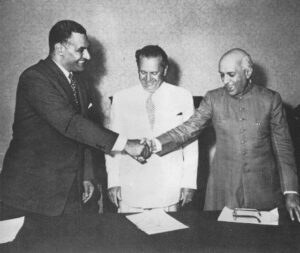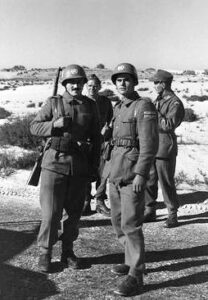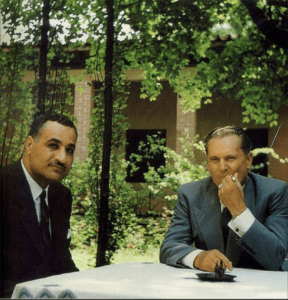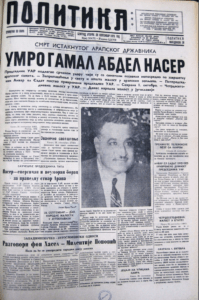
An Egyptian Leader of the Arab World
On 19 July 1956, Gamel Abdel Nasser was returning from the meeting that would lead to the creation of the Non-Aligned Nations Movement and a new Third World, when he received word that the United States and Great Britain had decided to withdraw their offers to fund the construction of the Aswan Dam.

The de-funding was not entirely unexpected. Egypt had been playing in both the Capitalist and Communist sandboxes since Nasser came to power. In fact, the Soviet Union had also promised aid for the construction of the dam, and had earlier brokered an arms deal with Nasser’s Egypt through communist Czechoslovakia.
Knowing that the withdrawal of funds by the US and Great Britain was a distinct possibility was vastly different from having the funding swiftly withdrawn, and Nehru was furious. He made the decision to stand on principle, and history was made. But Nasser’s success was by no means a done-deal during what came to be known as the Suez Crisis. As fellow-NAM-leader Jawarharlal Nehru of India wrote at the time, “This is by far the most dangerous and difficult situation in international affairs we have faced since independence.”
On 26 July, Nasser announced his decision to nationalize the Suez Canal, cutting off British interests. His speech was vitriolic toward what he termed “British Imperialism”, and it was received with great support throughout the Arab world.
The reaction of South Africa’s Prime Minister mirrored that of much of the world, “It is best to keep our heads out of the beehive.”
On 29 October, Israel, pursuant to an agreement with France and Great Britain, invaded Egypt. On 5 November, Britain and France landed paratroopers along the canal.
After an international uproar, including condemnation by the Eisenhower administration in the United States and intervention threats from the Soviet Union, the British and French forces withdrew in the end of December. They were replaced by the United Nations Emergency Force (UNEF). Israeli forces withdrew from the Sinai in March 1957.

The Suez Crisis was Nasser’s first major appearance on the world stage in a starring role and it made him the undisputed leader of the pan-Arab world in international affairs. So much so that in 1958 Egypt and Syria merged, with Nasser as undisputed leader, to form the United Arab Republic. Soon after, North Yemen was added into the mix as a loose federation.
Nor did Nasser slip comfortably into a junior role with the Soviet Union. Despite the USSR’s support during the Suez Crisis and the funding to build the Aswan Dam, when Khrushchev demanded that the restrictions on the communist party be lifted, Nasser accused him of trying to meddle in Arab affairs and refused.

Nasser continued to be one of the leaders of the Non Aligned Movement, and was close to Marshal Tito of Yugoslavia, reportedly keeping a photo of Tito on his desk for the rest of his life.
On 28 September 1970, Nasser died of a heart attack. His health problems had been hidden from the general public, but he was a heavy smoker and had both advanced arteriosclerosis and diabetes. More than five million people came for his funeral procession, Yugoslavia instituted a national day of mourning, and the Arab world reeled in shock. Approximately 75,000 people marched through the streets of Jerusalem, chanting, “Nasser will never die!”

Nasser’s legacy is complicated. He presided over complete independence from Britain. He also raised the standard of living, nationalized several industries, and ushered in a golden age of Egyptial culture. Under Nasser, Egypt became a world leader of developing nations.
But, Nasser also severely curtailed civil liberties. Nasser had no challengers, and his legislature was merely present to rubber stamp his decisions for the nation. There were political arrests, torture, and detentions. Wire taps were used with impunity. And after the Suez Crisis he expelled many of Egypt’s Jews and confiscated their businesses and belongings.
Nasser’s legacy can be viewed from many angles, but it cannot be denied that the legacy itself is great.
- September 28, 2020
- History , Interesting
